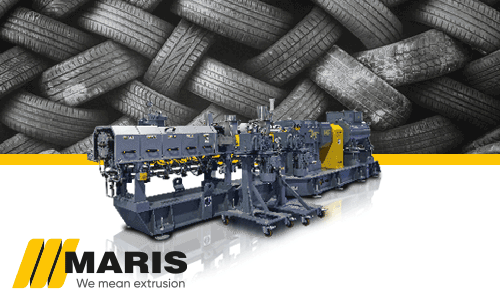Weibold Academy: green supply chains and CSR – a strategic approach
Weibold Academy article series discusses periodically the practical developments and scientific research findings in the end-of-life tire (ELT) recycling and pyrolysis industry.
These articles are reviews by Claus Lamer – the senior pyrolysis consultant at Weibold. One of the goals of the review is to give entrepreneurs in this industry, project initiators, investors and the public, a better insight into a rapidly growing circular economy. At the same time, this article series should also be a stimulus for discussion.
For the sake of completeness, we would like to emphasize that these articles are no legal advice from Weibold or the author. For legally binding statements, please refer to the responsible authorities and specialist lawyers.
Introduction
In recent years, Corporate Social Responsibility (CSR) has evolved from a peripheral concern to a central pillar in the strategic planning of businesses worldwide. CSR encompasses a company's initiatives to assess and take responsibility for its effects on environmental and social well-being. This shift reflects broader societal changes, including increased public awareness of environmental issues, more stringent governmental regulations, and a growing expectation for businesses to contribute positively to society.
In the context of supply chain management, CSR is particularly significant. Supply chains are complex networks involving multiple stakeholders, and the integration of CSR principles can enhance sustainability, drive efficiency, and build stronger relationships with consumers. This article explores the impact of different CSR implementation modes on sustainable supply chain pricing and green decision-making, focusing on how these practices can lead to improved economic performance and social welfare.
The Importance of CSR in Modern Business
The modern industrial economy has brought about unprecedented growth and prosperity, but it has also led to serious environmental challenges, including resource depletion and pollution. As these issues become more pressing, both consumers and governments are demanding more responsible behavior from businesses.
Consumers today are more environmentally conscious and are willing to support companies that demonstrate a commitment to sustainability. Studies show that a significant portion of consumers are prepared to pay a premium for green products that minimize environmental impact. This trend is not just a fad but a profound shift in consumer behavior that businesses must acknowledge.
Governments are also playing a crucial role by implementing regulations and policies that encourage or even mandate sustainable practices. Examples include carbon taxes, emissions trading systems, and subsidies for green technologies. These policies create a business environment where sustainable practices are not only beneficial but necessary for compliance and competitive advantage.
Understanding CSR in Supply Chains
CSR in supply chains involves various practices aimed at improving social, environmental, and economic outcomes. These practices can range from ensuring fair labor conditions and reducing carbon footprints to enhancing product transparency and investing in community development. For supply chains, which involve a series of interconnected businesses, the implementation of CSR practices can lead to significant improvements in overall performance.
One of the critical aspects of CSR in supply chains is the production of green products—those designed with environmental sustainability in mind. Green products often involve the use of sustainable materials, energy-efficient production processes, and reduced waste. However, the integration of green products into supply chains poses several challenges, particularly concerning pricing strategies and the balance of economic and environmental goals.
Comparative Analysis of CSR Implementation Modes
To understand the impact of CSR on supply chain management, a recent study by Li, Liu, and Li (2024) provides valuable insights. The study uses game theory to model three distinct scenarios of CSR implementation in a supply chain that produces both green and ordinary (non-green) products. The three scenarios are:
- CSR-Absence Scenario (Model N): Neither the manufacturer nor the retailer implements CSR.
- Retailer Implementing CSR Scenario (Model R): The retailer takes on CSR responsibilities, focusing on the consumer end.
- Manufacturer Implementing CSR Scenario (Model M): The manufacturer adopts CSR practices, focusing on the production end.
By analyzing these models, the study aims to determine the optimal pricing, green decision-making, and supply chain profit under each scenario.
Green Product Greenness and Pricing
The study reveals that CSR activities have a significant impact on the greenness of products and their pricing strategies. In Model R, where the retailer implements CSR, green products achieve the highest level of environmental friendliness. This scenario also results in the lowest retail prices for green products, making them more accessible to consumers. In contrast, Model M, where the manufacturer adopts CSR, leads to greener products than Model N but not as green as those in Model R. Retail prices in Model M are higher than in Model R but lower than in Model N.
The reason behind this is that retailers are closer to the end consumers and better understand their preferences and demand patterns. By implementing CSR, retailers can more effectively promote green products, encouraging manufacturers to produce more sustainable goods.
Demand Dynamics
Demand for green products is intrinsically linked to their pricing and perceived greenness. The study finds that the demand for green products is highest in Model R, followed by Model M, and lowest in Model N. This suggests that retailer-led CSR initiatives are more effective in promoting green products to consumers. Retailers, being closer to consumers, can better gauge market demand and adjust their strategies accordingly.
On the other hand, the demand for ordinary products decreases as CSR involvement increases. This shift highlights the growing consumer preference for green products when they are competitively priced and environmentally superior. Retailer-led CSR initiatives thus play a crucial role in shifting consumer behavior towards more sustainable choices.
Economic and Social Welfare
Implementing CSR within the supply chain has profound implications for both economic and social welfare. The study shows that the overall profits of the supply chain are maximized when the retailer implements CSR, provided the level of CSR implementation is within a reasonable range. Excessive CSR commitments by retailers, however, can lead to diminishing returns and potential profit losses.
For manufacturers, adopting CSR can initially lead to a reduction in profits due to the high costs associated with green investments. However, this loss can be mitigated if retailers also engage in CSR activities, creating a synergistic effect that benefits the entire supply chain. Social welfare, which encompasses both consumer surplus and overall supply chain profit, is highest when the retailer implements CSR, followed by the manufacturer, and lowest in the absence of CSR.
Practical Implications and Strategic Recommendations
The findings of the study have several practical implications for businesses and policymakers. They underscore the importance of strategic CSR implementation in supply chains, particularly highlighting the efficiency of retailer-led CSR initiatives.
For Businesses
- Retailer Initiatives: Retailers should take the lead in implementing CSR initiatives. Their proximity to consumers allows them to better understand and influence consumer preferences, making them more effective in promoting green products. Retailers can leverage their position to encourage manufacturers to adopt greener practices by demonstrating strong consumer demand for such products.
- Collaboration: Manufacturers and retailers should collaborate closely on CSR initiatives. By working together, they can create a more integrated approach to sustainability that benefits all stakeholders. Manufacturers should be open to feedback from retailers regarding consumer preferences and be willing to invest in green technologies that align with these preferences.
- Balanced Approach: While implementing CSR, businesses must find a balance that maximizes social and environmental benefits without compromising economic performance. This involves setting realistic CSR goals that do not overextend the company's resources.
For Policymakers
- Incentives: Governments should provide incentives such as subsidies, tax breaks, and grants to support businesses in their CSR efforts. These incentives can help offset the costs of green investments and encourage more companies to adopt sustainable practices.
- Regulations: Policymakers should establish clear and enforceable regulations that promote sustainable practices across industries. These regulations can create a level playing field and ensure that all businesses adhere to minimum standards of environmental and social responsibility.
- Public Awareness: Governments can also play a role in raising public awareness about the importance of sustainable consumption. Educational campaigns and public service announcements can help shift consumer behavior towards more environmentally friendly products, further supporting businesses' CSR initiatives.
Case Studies and Real-World Examples
To illustrate the practical application of these principles, several companies across different industries have successfully integrated CSR into their supply chains.
Automotive Industry (Ford and Toyota)
Both companies offer a range of vehicles, including traditional fuel-powered cars and new energy vehicles. By investing in the development and production of electric and hybrid vehicles, these companies have not only reduced their environmental impact but also met the growing consumer demand for eco-friendly transportation options. Their CSR initiatives include reducing emissions, increasing fuel efficiency, and using sustainable materials in manufacturing.
Consumer Electronics (Philips and Gree)
Companies in the home appliance sector, such as Philips in the Netherlands and Gree in China, have developed energy-efficient products that consume less power than conventional appliances. These green alternatives not only help reduce energy consumption but also lower greenhouse gas emissions, aligning with global sustainability goals.
Fashion Industry (Hailan House and Tebu)
In the garment industry, brands like Hailan House and Tebu have introduced environmentally friendly fabrics that are biodegradable and recyclable. These companies are addressing the environmental impact of the fashion industry by promoting sustainable materials and processes, reducing waste, and encouraging responsible consumption.
Challenges and Future Directions
Despite the clear benefits of CSR in supply chains, several challenges remain. Implementing CSR requires significant investment, and not all companies have the resources to make such commitments. Additionally, measuring the impact of CSR activities can be complex, and businesses may struggle to quantify the benefits relative to the costs.
Looking forward, businesses need to develop more sophisticated tools and metrics to assess the effectiveness of their CSR initiatives. Technological advancements, such as blockchain and IoT (Internet of Things), can enhance transparency and traceability in supply chains, making it easier to monitor and report on CSR activities.
Moreover, as global supply chains become more interconnected, companies must adopt a more holistic approach to CSR, considering the broader impacts of their operations. This includes addressing issues such as labor rights, community engagement, and broader environmental impacts beyond just product sustainability.
Conclusion
Corporate Social Responsibility is a powerful lever for driving sustainability in supply chains. The comparative analysis of different CSR implementation modes highlights the superior effectiveness of retailer-led CSR initiatives in enhancing green product attributes, reducing prices, and boosting demand. While manufacturers also benefit from CSR, the most significant gains in social welfare and economic performance are achieved when retailers take the lead.
As businesses navigate the complexities of integrating CSR into their supply chains, strategic collaboration and supportive policies will be key to maximizing the benefits. Ultimately, the commitment to CSR not only fosters a sustainable future but also strengthens the economic and social fabric of supply chains, creating lasting value for businesses and consumers alike.
Weibold is an international consulting company specializing exclusively in end-of-life tire recycling and pyrolysis. Since 1999, we have helped companies grow and build profitable businesses.











